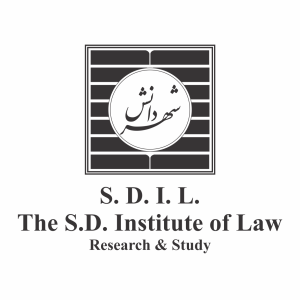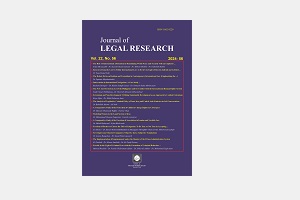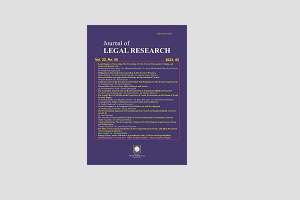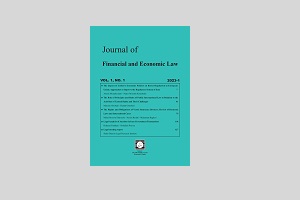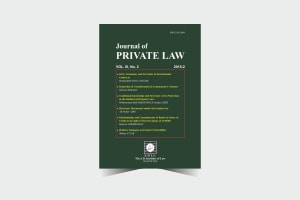Journal of
Criminal Law and Criminology
Number 9
Vol. V ● No. 1
Spring – Summer 2017
Managing Editor: Vahid Eshtiagh
Editor-in-Chief: Mohammad Ashoori
CONTENTS
Articles
Protection of Terrorism Victims in the Light of Humanization Process of International Law
Dr. Hossein Sharifi Tarazkouhi & Fatemeh Fathpour
The Survey of Yezidis’ Genocide by ISIS in Iraq
Dr. Mortaza Javanmardisaheb & Mohammad Bagher Rastegar Mahjanabadi
Free Will as the Foundation of Criminal Responsibility in the Debate between Compatibilism and Incompatibilism
Dr. Rahim Nobahar & Mohammadreza Khatteshab
Criminological Study the Impact of Major Depressive Disorder on Attitudes toward Drugs
Gholamhosein Karimi kohaki & Mehri Zamanzadeh Behbahani
The Legal Coherence in International Criminal Law (According to the Multiplicity of Institutions and Origins)
Dr. Alireza Bagheri Abyaneh
Concept of Victim in International Criminal Law
Dr. Seyed Ebrahim Hosseini & Dr. Seyed Ghasem Zamani
Articles
Protection of Terrorism Victims in the Light of Humanization Process of International Law
Dr. Hossein Sharifi Tarazkouhi
Associate Professor of International & Public Law Group, Law & Political Science Faculty
of Islamic Azad University Science and Research Branch, Tehran,
&
Fatemeh Fathpour
Ph.D. Candidate of International Law, Shahid Beheshti University
Abstract:
Development and transformation of international norms and structures is being affected by two general approaches of state-centric and human-centric toward international law. Humanization process of international law which is rooted in Kant’s moral teachings and resulted in changing of attitude to individual’s place in the system of international law has also impact on the field of terrorism and its victims.
This process began with adoption of the declaration of the United Nations general assembly in 1985 and then has been continuing in various instruments in the global and regional levels. At the same time, in addition to the norms, the structures of international law are affected by this process.
Overall, however, this turning towards moral and material support of victims of terrorism is quite competent and worthy of praise but it seems that these efforts are not enough.
In addition to increasing the range of supporting measures, the content of international soft law documents must be incorporated in international binding conventions. Yet support of victims of terrorism is in need of reforms in the structures of international law.
Keywords: Terrorism, Victims of Terrorism, Protection of Victims, Terrorist Acts, Countering Terrorism.
The Survey of Yezidis’ Genocide by ISIS in Iraq
Dr. Mortaza Javanmardisaheb
Assistant Professor of Kurdistan University,
&
Mohammad Bagher Rastegar Mahjanabadi
M.A Student of Criminal Law at Kurdistan University
Abstract:
The “Islamic State of Iraq and Sham”, the ISIS for short, in a military operation, in order to dominate the Neinava Province and a region the center of which is the city of Sinjar on the northwestern coast of the country of Iraq, has committed crimes such as wholesale killing, enslaving the people, and the destruction of sacred places, against the denizens who are recognized as Yezidis. The ISIS has also obligated the Yizidis to convert to Islam and has displaced them into the mountains in an extreme condition of the summer heats of 2014. This being reflected in the universal media, has proposed the accomplishment of genocide as an international crime. This problem in the present study has been investigated through the adaption of the subject features (the victimized, the committed crimes, and the recognition of the criminal’s thought situation) with the conditions of crime check in the prevention and punishment of genocide convention. The characteristic under study is that the ISIS not only helps denying the crimes, but also justifies them according to the Islamic doctrines and specifically the Holy Quran as the primary source of Ijtihad in the religion. This claim although appears correct on the face of it, however through scrutiny and authorized interpretations of the Holy Quran their fallacy is exposed. Therefore, their crimes analyzed through the convention is not coordinate with their being in the wrong, and, in any way, their claim is not legal to be surveyed in their crime justification.
Keywords: International Crime, Genocide, Yezidi, Kurds, ISIS.
Free Will as the Foundation of Criminal Responsibility in the Debate between Compatibilism and Incompatibilism
Dr. Rahim Nobahar
Associate Professor, Faculty of Law, Shahid Beheshti University,
&
Mohammadreza Khatteshab
M.A in Criminal Law and Criminology, Faculty of Law, Shahid Beheshti University
Abstract:
Criminal law presupposes human beings are rational agents who have free will and ability to control their conducts. Raising doubt about this presupposition would threaten and harm criminal law. It is because punishing a person who has no control over his acts is unjust. Furthermore, determinism makes some major functions of criminal law like deterrence nonsense. Obviously, law cannot guide the forced persons who have no free will. Some philosophers raise the idea of impossibility of free will for human being by reference to the causal universe in which we live. This article considers two basic approaches about free will and determinism; i.e. compatibility and incompatibility. It also tries to make a consistency between the acceptance of free will of human being along with causal relations and living in a causal universe. Such an approach, according to the authors would provide background for having a more just and fair understanding of criminal responsibility.
Keywords: Determinism, Free Will, Compatibilism, Incompatibilism, Criminal Responsibility.
Criminological Study the Impact of Major Depressive Disorder on Attitudes toward Drugs
Gholamhosein Karimi kohaki
Ph.D. Student, Criminal Law and Criminology, Faculty member (Educator), Department of Law, Behbahan Branch, Islamic Azad University, Behbahan, Iran,
&
Mehri Zamanzadeh Behbahani
Ph.D. Student, Criminal Law and Criminology, Faculty member (Educator), Department of Law, Behbahan Branch, Islamic Azad University, Behbahan, Iran
Abstract:
Delinquent disease that affects the outer and inner conscious and unconscious motivations crime is committed. And hence in need of correction and treatment some deviations and crimes are being committed by people with mental disorders. These people are a bunch of people with major depression. Criminologists found to provide a thorough study of crime and deviance at the same time or inclination to investigate organized crime and crime situation before payment. Field research method was causal-comparative method to predict the impact of depressive illness major relationship with attitude toward drug. To this end, 40 people were tested in Behbahan city. Subjects were 20 patients with major depression and 20 normal matched, 10 male and 10 female. To check out questionnaires to examine attitudes towards drugs, the two groups were used. Data obtained through descriptive statistics, frequency and percentage and inferential statistics (chi-square test) were analyzed. The results showed: in terms of attitudes towards drugs among individuals with major depression, the general attitude, emotions, beliefs and readiness to act against drug abuse, there is a significant difference compared to normal individuals. This means that depressed people are more vulnerable.
Keywords: Attitude towards Substance Abuse, Major Depression, Drug Attitude Inventory, Mental Criminology.
The Legal Coherence in International Criminal Law (According to the Multiplicity of Institutions and Origins)
Dr. Alireza Bagheri Abyaneh
Assistant Professor of Payam Noor University, Qazvin Province
Abstract:
The coherence of a legal system can be classified in three degrees: 1- The system is completely coherent; 2- Legal pluralism can be occurred in a legal system; 3- The legal system experiences some degrees of fragmentation. International criminal law overlaps international law thus many concepts and institutions of international law affect it. Additionally it is a new discipline in law hence it has its own system. Thus In some subjects the conflict of norms, the obscurity in hierarchy of institutions and finding the appropriate regulation are inevitable.
For example the relationships between ICJ and ICC or relationships between the international criminal courts are obscure.
By paying attention to these kinds of problems, it can be argued that this system is a kind of legal pluralism and the fragmentation does not happen at least right now.
Keywords: Legal Pluralism, Fragmentation, International Criminal Law, Human Rights, International Humanitarian Law.
Concept of Victim in International Criminal Law
Dr. Seyed Ebrahim Hosseini
Department of Law, Boukan Branch, Islamic Azad University, Boukan, Iran
&
Dr. Seyed Ghasem Zamani
Associate Professor of Law, Allameh Tabataba’i University, Tehran, Iran
Abstract:
Defining the concept of victim in international criminal law has a considerable significance in terms of its tight relations with crime and reparation that must be paid to victim. In simple meaning, victim is a person – natural or legal – suffered from perpetration of international crimes. Persons could be victimized both directly and indirectly; in this sense, family and relatives of a direct victim also could be known as victims. Subsequent to this, suffered incurred could be physical, psychological, mental, emotional, financial and etc. According to instruments in humanitarian law and statute of international criminal court and other international criminal tribunal, there are two categories of victims; first, natural persons that they are the main victims of international crimes and second, institutions, organizations and sometimes cultural properties. Of course, international community as history shown also can be introduced as a permanent victim in every international crime. Thus, any kind of damage incurred to any of these victims must be repaired when an international crime committed against them. Generally speaking, it could be said that damages could be repaired even in situations that there is no direct victims because there is always an international community.
Keywords: Victim, International Crime, Natural Person, Legal Person, International Community.
